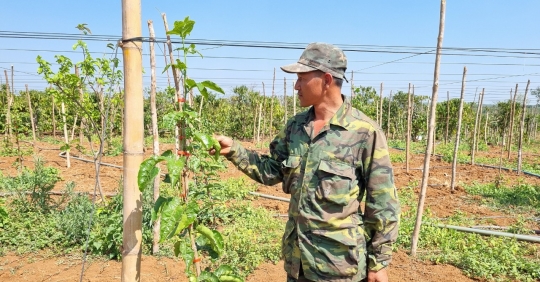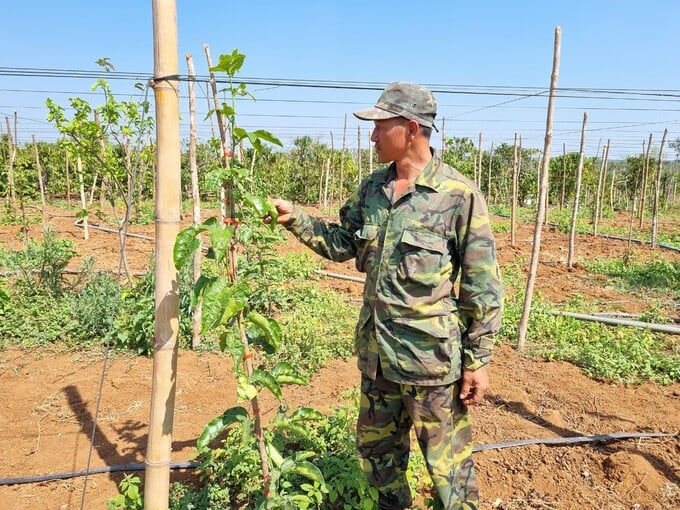
Many coffee gardens have been replaced by passion fruit. Picture: Tuan Anh
Given the appeal of the profit that passion fruit trees bring, many households in Gia Lai are massively destroying old, under-yielding coffee to convert crops.
Passion fruit from our own cultivation
Chu Pah District (Gia Lai Province) is one of the places with the largest area of passion fruit trees in Gia Lai Province. From a few dozen hectares in 2016-2017, the passion fruit area has grown to over 500 hectares today, of which 400 hectares are cultivated in coffee gardens, 100 hectares are purely planted.
Taken in Ia Mo Nong Township (Chu Pah District), the concrete roads leading to the people’s production area with thousands of coffee trees are now gradually being covered with fruit-laden passion fruit gardens. At the time the reporter noted, a number of old, under-yielding coffee gardens were being cut down by people in preparation for planting passion fruit.
Perhaps people will see the immediate benefits when investing in one hectare of passion fruit costs about VND 150 million and earns about VND 500 million within a year. While the price of passion fruit has always been high and stable for many years, many people are increasingly encouraged to invest in its cultivation. Since then, coffee gardens have been mercilessly cut down to be replaced by passion fruit.
Mr. Pham Van Truong (Mon Village, Ia Mo Nong Township, Chu Pah District), who takes care of the family’s 1-hectare passion fruit garden, said that before the Lunar New Year, this place was still a coffee garden, which was then cut down as passion grew Fruit, about 2 months to harvest.
“The previous coffee garden was old and old, so the yield was low, only reaching almost 20 tons/ha. If they kept the coffee garden there would be no profit so the family decided to dismantle it to replant and replant the same variety. new, high yields. During land reclamation for about a year, I didn’t know what to do. When I saw people flocking to plant passion fruit, I invested in them too. more income,” Truong said, saying people in that area are cutting down on coffee to grow a lot of passion fruit.
When asked why he chose passion fruit trees to plant, Truong said that passion fruit prices are high along with a stable consumption market when there are many large factories in Gia Lai and Dak Lak for people to buy. Not to mention, traders and co-ops also shop for people, so they don’t have to worry about passion fruit not being able to sell.
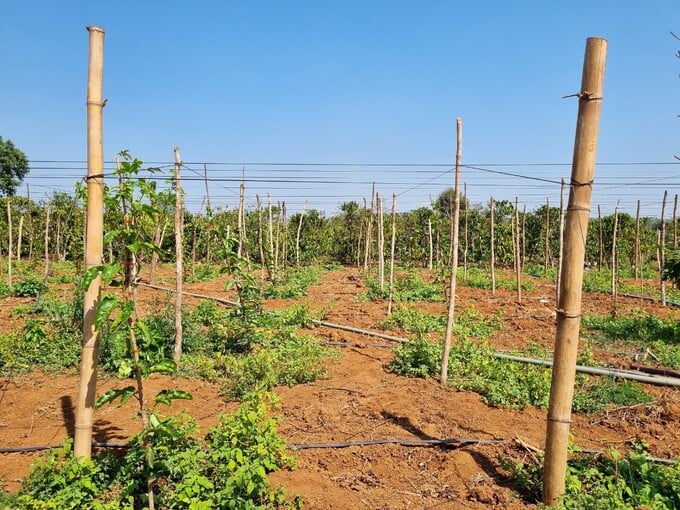
Passion fruit brings high profits, so people destroy old coffee at the same time. Picture: Tuan Anh
Ms. Tran Thi Minh (Mon Village, Ia Mo Nong Township) said that the reason why many households in this area rushed to plant passion fruit is because in the past, mass media always informed about the export of passion fruit, durian very good, high price. On the other hand, growing passion fruit only takes about 6 months to harvest, leaving many households towed.
The history of passion fruit coffee mining is also happening in Dak Doa, Mang Yang, Ia Grai districts at the same time… In Mang Yang district, Mr. Ngo Van Doanh (Linh Nham Village, Dak Djrang Municipality) decided to plant Garden 1, 4 ha of coffee to grow passion fruit from early 2022. So far he has collected 3 batches of almost 60 tons, which were sold at 14 – 17 thousand VND/kg. This year he continues to plant 6 more passion fruit trees in the old coffee area.
Mr. Vo Minh Quang, head of the Department of Agriculture and Rural Development of Mang Yang District, said many old coffee-growing areas in the area have been converted into passion fruit by people. If the district has 382 ha of passion fruit in 2022, then in the first 3 months of this year 4 municipalities have reported an increase of 105 ha. Households plant passion fruit on a 2-year cycle and on the 3rd year they replant coffee trees.
The attraction of profit from the passion fruit
The price of passion fruit is currently around 14.00 VND/kg, on average, 1 hectare of passion fruit grows 40 tons of fruit, minus the cost, the profit will be between 350-400 million VND/ha. While the same area is planted with coffee, the profit at the current price (46,000 VND/kg) is only 100-120 million VND. Because of the profit attraction of passion fruit trees, many households are determined to destroy their coffee gardens after many years of affection.
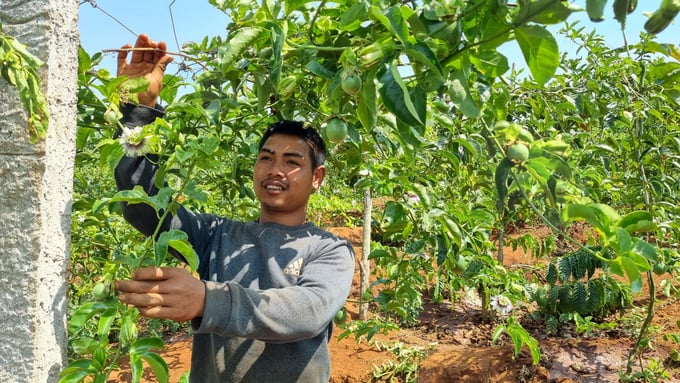
The life of Huyk’s family improves through the cultivation of passion fruit. Picture: Tuan Anh
Mr. Pham Duc Phuong (Village 2, Ia Ka Township, Chu Pah District) said that his family has been growing 1 ha of coffee since 1999, but now the garden is old and has little yield, so he decided to cut it down for money to save .growing passion fruit. “The passion fruit garden is expected to be harvested in October this year, the price is around VND 14,000/kg, if the price remains stable in the near future, the family will make a big profit. This is a tree with high economic value and favorable yield, so I plan to expand the area,” Phuong said.
Huyk’s family (Ve Village, Ha Bau Municipality, Dak Doa District) was previously entirely dependent on coffee production. Due to the aging of the orchard, the yield is low, while the price of coffee has fallen and fertilizer has increased, causing many difficulties for his family. In 2022, Mr. Huyk decided to destroy the coffee garden while learning and importing passion fruit varieties from a unit in the province to plant. After half a year of sowing, the family’s 6 passion fruit sticks are still thriving and are being harvested.
“Currently, the family harvests 5-6 tons of fruit every month and sells it to a local company at a price of VND 14,000/kg. Thanks to passion fruit, the family economy has improved, there is a source of income every month,” said Huyk.
Mr. Huyk pointed to the coffee garden 5 sao nearby, which had just been demolished, and said that in the future the family will continue to plant passion fruit seeds to generate more income while accumulating real money to replant coffee next year. Because, according to Huyk, the coffee tree has been part of the family for many years anyway. On the other hand, coffee is still a key plant for sustainable development, so you cannot give it up.
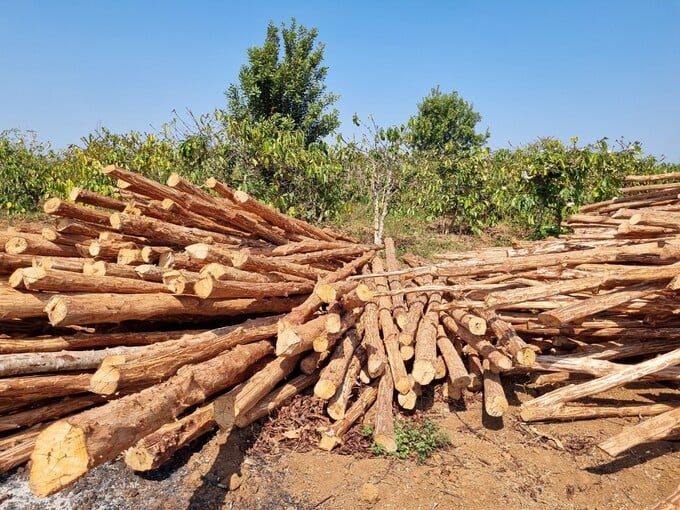
People prepare to plant passion fruit stakes next to old coffee garden. Picture: Tuan Anh
According to Mr. Nguyen Kim Anh, head of the Ministry of Agriculture and Rural Development of Dak Doa District, since passion fruit was officially allowed to be imported from China .that the growing area as well as the packaging plant. The price of passion fruit has been very stable in recent years, so people in the district have made the best of the coffee growing area to harvest passion fruit trees.
In addition, the areas that are no longer suitable for pepper plants are also used by people to switch to growing passion fruit. Passion fruit trees are suited to the local climate and soil therefore they have a high yield averaging around 40 tons/ha. At present, compared with some other crops, passion fruit provides high income, many households also become rich from this crop. Therefore, people do not give up coffee to switch to passion fruit, but make the most of the time to improve the soil to switch short-term crops.
After growing passion fruit for 1-2 years, people started growing with newly planted coffee trees to be more stable. Currently, this model is developing strongly in the district with the area of passion fruit cultivation in the district over 650 ha, an increase of about 100 ha compared to last year.
Mr. Nguyen Kim Anh, head of the Department of Agriculture and Rural Development of Dak Doa District, said the district has identified passion fruit as one of the suitable trees for the development of the local staple. However, from an industry point of view, the district focuses on the development of passion fruit trees that do not follow market prices, but orient people towards sustainable production with close production relationships. Since many areas of passion fruit are in the period of basic development, traders compete to purchase and select good fruit for export.

